



FEATURE dAju reLeAses “rAin” reMix with denis juLiA







FEATURE dAju reLeAses “rAin” reMix with denis juLiA


Although President Donald Trump’s “One Big Beautiful Bill” passed in the U.S. House, the changes to Medicaid and other unpopular features, have a long road to becoming law. The bill – that barely passed -- goes to the U.S. Senate, where it may be changed and then voted on yet again before heading to the president’s desk for his signature. Given how close the vote tally was in the House, it’s likely that the Senate will water down or not greenlight some of the more controversial features in the House bill.
This uncertainty is good news for now as millions of Medicaid recipients await with bated breath a final bill. However, if the House bill plows ahead unchanged, it’s estimated that up to 7.6 million people could lose their Medicaid health insurance over the next 10 years.
While the bill needs to be further debated and fleshed out, and if the Republican majority in the Senate holds, the conventional wisdom is that those most at risk of losing their health insurance are low wage workers with inconsistent hours, undocumented immigrants who receive care from local programs funded by federal money, seniors and individuals with disabilities who cannot meet new work requirements, and many other of the most vulnerable groups in society.
Should federal dollars dry up it will put the burden on states to continue some of the health programs should there be a political will to do so based on budgetary feasibility. Lawmakers will have tough choices to make on how to offset federal reductions.
The Center on Budget and Policy Priorities said, “Cutting Medicaid by taking away coverage and shifting costs to states will have long-term and expensive repercussions, including worse health outcomes, greater costs to hospital systems, and straining state and local economies.”
In the starkest and bleakest way of describing what losing Medicaid means – many people will not be able to afford healthcare and will die from it. People with chronic health conditions losing Medicaid means they must do with less of other basic needs like reducing how much groceries they buy just to continue their healthcare.
Families and their children will be hurt. Medicaid helps two out of every five children, providing essential health coverage that is vital to their well-being. Medicaid is often relied upon for workers in transition who suddenly lose their jobs and medical coverage. Some states who provide gap insurance during this transitional time rely on federal funds. Such programs could be impacted. Medicaid has been relied upon by single parents. Many of them are hardworking but barely make enough to support their children. At the very least, Medicaid gave them peace of mind that there is health insurance for them should they get sick. Without Medicaid, it’s highly likely that single parents on a tight budget will

SPublisher & Executive Editor
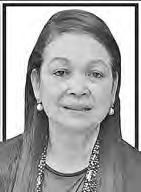
ome 403,670 adults and children (61,000 Filipinos) MedQUEST enrollees are at-risk of losing their health insurance if the U.S. Senate passes the Trump-supported “One Big Beautiful Bill Act” which was previously approved by the U.S. House. Med-QUEST is Hawaii’s Medicaid Program. The bill seeks to implement work requirements and other changes to Medicaid that experts say could cut about 7.6 million people from the program. For our cover story this issue, associate editor Edwin Quinabo reports on the politics behind the bill, details of the proposed changes, and the possible ripple effect it could have on Hawaii’s healthcare system. Politicians, medical experts and members in our Filipino community share their thoughts on this weighty and consequential bill.
Covering other provisions beyond Medicare in the “Big Beautiful Bill Act” is HFC columnist Gary Hooser’s commentary “The Proposed U.S. Budget - Moral, Immoral, or Amoral?” Turning to the state-level legislature, we have a contribution by Keli‘i Akina, president of the Grassroot Institute of Hawaii, who gives us a review of the Hawaii State Legislature’s recently concluded session.
Certainly, of interest for our Gen Z and Millennial readers is HFC contributor Renelaine Bontol Pfister’s feature on Hawaii-based singer and producer Daju and Philippines-based singer-songwriter Denise Julia. The Filipino artists recently collaborated on a remix of Daju’s viral hit “Rain” that’s already getting hundreds of thousands of streams on Spotify.
HFC columnist Rose Cruz Churma submits a book review on “OTA CAMP, Filipinos in Hawai’i Fight Eviction.” It’s a fascinating history of old Waipahu, a camp originally located near St. Joseph’s Catholic Church. The book chronicles the Ota Camp residents’ housing struggle. Churma writes, “This book is timely—the lack of affordable housing and homelessness continue to plague the State. Perhaps the retelling of the Ota Camp struggle will serve as an inspiration.”
HFC columnist Dr. Arcelita Imasa contributes “Celebrate Our Caregivers!” June 7 is recognized as World Caring Day, or Caregivers Day. We join our community in showing appreciation for our caregivers who are some of the most compassionate people. In news, we have Maui Filipino Chamber’s 2025 Gintong Pamana Leadership and Scholarship Awardees. Be sure to read our other interesting columns and news.
Lastly, I’d like to remind our local businesses that one of the best ways to reach our massive Hawaii Filipino community is by advertising in Filipino media like our newspaper. For your advertising needs, contact us at: filipinochronicle@gmail.com. Also, I want to close by wishing all our fathers a Happy Father’s Day. You’ve been our anchor of strength and backbone of the family. We love you.
Thank you for supporting the HFC. Be sure to visit our website thefilipinochronicle.com to get your free e-copy of each issue, as well as connect with us on our social media pages Meta (Hawaii Filipino Chronicle), Instagram (@the_filipino_chronicle) and Twitter (@HiFilChronicle). Until the next issue, Aloha and Mabuhay!

Charlie Y. Sonido, M.D.
Publisher & Managing Editor
Chona A. Montesines-Sonido
Associate Editors
Edwin QuinaboDennis Galolo
Contributing
Editor
Belinda Aquino, Ph.D.
Design Junggoi Peralta
Photography
Tim Llena
Administrative Assistant
Lilia Capalad
Editorial & Production Assistant
Jim Bea Sampaga
Columnists
Carlota Hufana Ader
Rose Cruz Churma
Elpidio R. Estioko
Willie Espero
Emil Guillermo
Gary Hooser
Arcelita Imasa, M.D.
Seneca Moraleda-Puguan
J.P. Orias
Charlie Sonido, M.D.
Emmanuel S. Tipon, Esq.
Contributing Writers
Clement Bautista
Edna Bautista, Ed.D.
Teresita Bernales, Ed.D.
Sheryll Bonilla, Esq.
Dr. Dylan Bothamley
Serafin Colmenares Jr., Ph.D.
Linda Dela Cruz
Carolyn Weygan-Hildebrand
Amelia Jacang, M.D.
Caroline Julian
Max Levin
Raymond Ll. Liongson, Ph.D.
Federico Magdalena, Ph.D.
Matthew Mettias
Maita Millalos
Paul Melvin Palalay, M.D.
Renelaine Bontol-Pfister
Seneca Moraleda-Puguan
Jay Valdez, Psy.D.
Amado Yoro
Philippine Correspondent:
Greg Garcia
Neighbor Island Correspondents:
Big Island (Hilo and Kona)
Grace LarsonDitas Udani
Kauai
Millicent Wellington
Maui
Christine Sabado
Big Island Distributors
Grace LarsonDitas Udani
Kauai Distributors
Amylou Aguinaldo
Nestor Aguinaldo
Maui Distributors
Cecille PirosRey Piros
Molokai Distributor
Maria Watanabe
Oahu Distributors
Yoshimasa Kaneko
Shalimar / Jonathan Pagulayan
Advertising / Marketing Director
Chona A. Montesines-Sonido
Account Executives
Carlota Hufana Ader
JP Orias

Universities across the nation should stand in solidarity with Harvard University as it pushes back against President Donald Trump’s revoking of the Ivy League school’s right to host international students via a federal student-visa program.
This latest attack on Harvard follows Trump’s earlier threat to stop all federal funding the school receives that’s estimated at $2.2 billion in multi-year federal grants. Trump is now suggesting that Harvard lose its tax-exempt status. It’s all cat and mouse, really.
The escalating punishment on Harvard comes after the university is defying Trump’s order to eliminate all DEI and affirmative action initiatives, further crackdown on Palestinian rights protests on campus, allow third-party oversight of many of its academic programs, and turn over the identities and conduct records of international students.
Harvard President Alan Garber said, “The University will not surrender its independence or relinquish its constitutional rights…No government – regardless of which party is in power – should dictate what private universities can teach, whom they can admit and hire, and which areas of study and inquiry they can pursue.”
(Medicaid Changes ....from page 2)
ignore body pains that require medical attention, ignore preventative medicine – doctors’ visits that could be lifesaving if illnesses are discovered early.
And when considering that the overall “One Big Beautiful Bill” will not save much but add $3.8 trillion over 10 years and basically amount to a transfer of wealth from working poor Americans to the wealthiest Americans – it’s conservative to say this bill is a cruel piece of legislation, even immoral, and certainly not “beautiful.”
While millions of Medicaid recipients will be cut from their healthcare insurance and have their overall quality of life lowered -- the “One Big Beautiful Bill” will have the top 0.1% of income earners stand to gain nearly $390,000 per year.
While the U.S.’ “hard power” (economic and military) arguably is waning, our nation’s “soft power” – the ability to influence others through attraction and persuasion rather than coercion or force -- remains robust. The U.S.’s soft power – our culture, values, and institutions’ influence globally -- is seen as our country’s greatest asset to many.
This is why some of the brightest students around the world come to Harvard and America’s elite universities. Foreign students make up about 25% at Harvard, about 40% at Columbia University, 44% at Carnegie Mellon University, 40% of graduate students at MIT, to name a few.
How does the U.S. benefit from foreign students? First, the work, especially in research, that these foreign students contribute to at Harvard helps to advance our nation’s leading edge in science, health and technology. Second, many of these students after graduation eventually work in the U.S. at some of the country’s top companies, hospitals and research institutions. Third, those who do return to their home countries bring with them American ideals of democracy, freedom of speech and a love for America. These students often end up as leaders in their respective countries that
This reality is harder to swallow when considering that Trump ran on a populist agenda to raise the standard of living for average and working poor Americans. Remember that Trump also promised not to touch Medicaid, along with Social Security and Medicare.
And it’s not just the average and working poor who will be affected by cuts to Medicaid, the entire healthcare system from hospitals to private practices will be impacted, health experts say. Doctors, hospital executives, and advocates have warned that changes to Medicaid could not only harm patients, but also quickly cause rural hospitals to close and force essential programs to shut down. Hospitals also warn of increased uncompensated care of their facilities with Medicaid cuts.
work towards better inter-country relations, cooperation and peace.
The value of geopolitical soft power cannot be underestimated and Trump’s wrecking ball on Harvard puts it at risk as the best and brightest worldwide could begin to elect to study at other top universities outside the U.S. Who loses in such a scenario? The U.S.
The attack on Harvard is ultimately an assault on academic freedom, the First Amendment and freedom of speech. The U.S Supreme Court has made it clear that academic freedom on university campuses is an essential component of that right to free speech.
Trump wants to control what’s said in classrooms and what universities research about so that they fit Trump’s ideological agenda. This is dangerous to our democracy and it’s unconstitutional. It also fits the pattern of other autocrats in other countries who target their universities for greater societal control.
No university should be in this position where if they do not comply with Trump’s demands, they could face tremendous financial hardship or in some cases could go bankrupt. It’s simply authoritarian.
One demand exceedingly disturbing is Trump’s directive to have him appoint a federal overseer who would audit every course, every department on campus, and
Russ Vought, the Director of the Office of Management and Budget, stated that discussions with the Senate commenced in the last week of May. Senators are expected to begin reviewing the House version of the bill in committees in June. Treasury Secretary Scott Bessent has said the final bill must pass before lawmakers leave for their summer break at the end of July.
Now is the time to organize and call your senator and your family and friends who live in other states to call their senators and say no to passing cuts to Medicaid. The U.S. Senate switchboard is (202) 224-3121. This number can connect you to any Senate office you request.
It’s recommended that you state not only your opposition to
that federal overseer would require Harvard to hire who Trump wants to teach and to change courses to meet his ideological preference. It’s beyond federal overreach, and ironic, considering that it is Trump and Republicans who’ve consistently for years complained about federal government overreach.
Besides greater control, critics believe Trump’s foreign student ban at Harvard is an extension of his xenophobic policies and culture wars. The divider-in-chief he is, Trump is attempting to make this into another populist-elitist wedge issue, saying he would consider giving that money diverted to Harvard to go toward trade school programs. That’s hardly believable considering all the ways in which he’s already failed middle-working and poor Americans like reducing inflation.
Fortunately, Harvard is the world’s richest higher education institution and has the deep pockets to fight Trump legally. But it will not be easy fighting against the full weight of the federal executive branch and potentially losing about a quarter of its students that pay full tuition.
Universities and colleges must stand with Harvard because it’s not just about Harvard but their own future. After Harvard, who’s next? Americans must also take a serious interest on this issue as well. It’s a fight for freedom of speech and a rejection of authoritarianism.
the “One Big Beautiful Bill” but specifically to also mention your opposition to Medicaid changes. Let our collective voices save Medicaid.

By Edwin Quinabo
Hawaii’s Filipino community is among the 403,670 adults and children enrolled in Med-QUEST in Hawaii who are at risk of losing their health coverage should the U.S. Senate push through the House’s “One Big Beautiful Bill Act” which is supported by President Donald Trump.
The Act – passed by the House on May 22, 2025, and currently in the Senate -- has a provision that could potentially reduce the number of Medicaid recipients by 7.6 million over the next 10 years, raising concerns among many beneficiaries about losing their coverage, according to the Congressional Budget Office (CBO). Medicaid is a joint federal and state health insurance program that provides health insurance to more than 71 million low-income and disabled Americans.
U.S. Senator Brian Schatz (HI) told the Hawaii Filipino Chronicle, “More than 400,000 people in Hawaii, which include nearly half of the children in our state, rely on MedQUEST. It’s a safety net program that’s supposed to protect the most vulnerable in our community. These proposed cuts from Republicans will take health care from people who need it most. It’s cruel, it’s un-American, and we are going to do everything we can in the Senate to stop this from happening.”
Given the close vote of the bill in the House -- 215–214–1 – politicos say Republican senators are finding it impossible to accomplish three things simultaneously: protect Medicaid, deliver a huge tax cut mainly to the rich, and prevent the budget deficit and national debt from exploding. Two of the three are possible, but not all three. Politicos anticipate the bill
gets bogged down or passed with major changes.
Critics of the bill say if the three Democrat representatives who passed away since the start of this legislative session were alive, the bill wouldn’t have made it out of the House.
President Trump said in a statement, “THE ONE, BIG, BEAUTIFUL BILL has PASSED the House of Representatives! This is arguably the most significant piece of Legislation that will ever be signed in the History of our Country! Now, it’s time for our friends in the United States Senate to get to work and send this Bill to my desk AS SOON AS POSSIBLE! There is no time to waste.”
“The media and the Democrats have consistently dismissed any possibility of House Republicans succeeding in our mission to enact President Trump’s America First agenda. Once again, they have been proven wrong. Today, the House has passed generational, nation-shaping legislation,” said House Speaker Mike Johnson.
Sen. Mazie Hirono said in a statement, “Medicaid is an essential resource that helps rural communities, people with disabilities, keiki, and kupuna access health care, and I will do everything in my power to protect this crucial program.”
She told KHON, “This is like a self-induced pain that is being imposed on the most vulnerable in our population. Why? Because the Republicans who are in charge of the House, the Senate and the White House want to make sure they have money to pay for tax breaks for the richest people in our country.”
Supporters of the bill argue it will curb dependency and make Medic-

aid more efficient by adding work requirements. House cuts to Medicaid amount to $625 billion.
Opponents of the bill say studies have shown that most working-age Medicaid recipients already have jobs -- 64% of those on Medicaid have jobs according to KFF but just don’t have enough hours to get medical coverage. Politicos say cuts to Medicaid are being made to extend the 2017 Tax Cuts which most benefit the wealthy. The 2017 Tax Cuts are set to expire at the end of 2025. The tax cuts in the “One Big Beautiful Bill Act” is the most expensive provision amounting to $2 trillion in tax breaks.
New York Congresswoman Alexandria Ocasio-Cortez said, “They’re not just out here to cut health care for health care’s sake, they have an assignment. Their assignment is to cut the taxes of their donors, and to have giveaways to Big Oil, which financed their election, Big Tech, which financed their election, Elon [Musk], [Jeff] Bezos, etc.”
The Senate is expected to review the bill and aim to come up with a decision by July 4th prior to recess. Senate Majority Leader John Thune who is tasked to shepherd the legislation through the upper chamber said they have only three votes to spare. Republican Sens Lisa Murkowski, (continue on page 5)
Josh Hawley, Susan Collins, and Rand Paul have expressed reservations. Sen. Paul said his red line for any bill is a debt ceiling increase. Hawley said his red line to the final package is cuts to Medicaid.
Besides added work requirements, the House version of the bill also requires Medicaid recipients above the federal poverty line to pay more fees for coverage, adds new verification requirements, increases the number of times states need to check the eligibility of their Medicaid expansion recipients,
Dr. Rainier Dennis Bautista, President of the Philippine Medical Association of Hawaii (PMAH), said about 60,987 or 14.8% of MedQUEST members are Filipinos. Medicaid in Hawaii is provided through Med-QUEST, a division of the Department of Human Services in Hawaii.
He told the Hawaii Filipino Chronicle, “Cuts to Medicaid would disproportionately impact our Filipino community, which has long relied on Med-QUEST for access to essential healthcare services. Many Filipino families include multigenerational caregivers, essential workers, and older adults managing chronic conditions. Losing coverage could mean losing access to medications, primary care, dialysis, and home-based services, thus putting thousands at risk.”
He said at his place of employment around 13% of the clinic’s patients are solely covered by MedQUEST. “The typical Med-QUEST enrollee is a working-age adult with a part-time or low-wage job that doesn’t offer employer-based insurance. Many of them work in retail, food service, caregiv-
prohibits Medicaid from being used for gender-affirming care, prohibits Medicaid from funding nonprofits that provide abortion care, and makes it harder for illegal immigrants to use Medicaid.
It’s a hyper contentious bill that is divided along party lines. Republican Sen. Joni Ernst recently has come under fire from Medicaid supporters after she shrugged off her constituents’ concerns at a townhall about the impact of the Medicaid cuts proposed in the GOP mega-bill. She said flippantly, “Well, we’re all going to die.”
ing, or tourism — sectors essential to our economy but often lack health benefits. Others are parents of young children, students balancing school and work, or immigrants navigating new beginnings.
“While Med-QUEST also supports seniors and people with disabilities, most adult enrollees are under 65 and earn too much to qualify for other public programs but not enough to afford private insurance. Without MedQUEST, they would fall into a coverage gap,” Dr. Bautista said.
Dr. Bautista describes one of his patients who he says there are countless others like him. This patient who is referred to as Fernando for privacy is in his early 50s who had to stop working after a series of escalating health issues. He had been a reliable worker for most of his life, but over time, his medical conditions began to accumulate: type 2 diabetes, congestive heart failure, and eventually end-stage renal disease (ESRD). Today, he requires dialysis three times a week, multiple medications, and regular visits with specialists to
“More than 400,000 people in Hawaii, which include nearly half of the children in our state, rely on Med-QUEST. It’s a safety net program that’s supposed to protect the most vulnerable in our community. These proposed cuts from Republicans will take health care from people who need it most. It’s cruel, it’s un-American, and we are going to do everything we can in the Senate to stop this from happening.”
manage his conditions.
Fernando is covered under Med-QUEST, and that coverage “is literally keeping him alive,” said Dr. Bautista. Through the program, Fernando has access to life-sustaining dialysis, his prescriptions, and coordinated care. His doctors, lab work, transportation assistance, and hospitalizations are all managed through the program. If his coverage were cut, he would not be able to afford all of these treatments out-of-pocket, and his survival would be in immediate jeopardy.
Dr. Bautista said there are many others like Fernando — “people whose medical complexity doesn’t align with their financial means, and who rely on Med-QUEST not for luxury, but for the basic continuity of care that keeps them stable. These are not hypothetical scenarios. These are real people, with real families, whose health hangs in the balance of how we choose to fund or cut programs like Medicaid.”
Dr. Bautista lays bare the human cost to Medicaid cuts — “the growing number of patients who will delay care, ration medications, or avoid the doctor altogether until their condition worsens and they end up in the
emergency room,” he said.
Critics warn that if passed, the bill could dismantle one of the country’s core public health pillars — with fallout felt in every state. In Hawaii, federal funds cover 73% of the $3 billion spent annually on Medicaid. It provides health care for 1 in 3 keiki and covers 1 in 3 births in the state. Around 60% of adults on MedQUEST are employed, often with multiple jobs.
Although details remain in the air, KFF said any reduction in federal Medicaid would leave states with tough choices on how to offset reductions. Based on analysis by the Center on Budget and Policy Priorities, Hawaii would have to raise taxes or cut other parts of its budget by an estimated $3 billion over 10 years to maintain Med-QUEST, including the Medicaid expansion to low-income adults.
“It’s a very holistic program and so I always think of it in the context of what does this do to people who are really trying their very best but struggling to make ends meet,” said Francoise Culley-Trotman, Alohacare CEO.
Until cuts are finalized, Medicaid providers, like Alohacare, say it’s important to voice your opinions or talk to your legislators. She said any cuts to Medicaid funding would be “very devastating” for Hawaii. “The difficulty of thriving in an expensive state itself is a challenge. When you remove those resources, you’re challenging the household and people’s ability to take care of themselves. There’s going to be disruption in caregiving,” said Culley-Trotman.
Health experts say if Medicaid cuts are made, it could affect the health coverage to low-income children and adults, pregnant women and aged, blind and disabled people, among others, for doctor visits, inpatient hospital services, prescription drugs and more. It also provides nursing home coverage and home-based care for those who qualify. Medicaid also acts as a temporary safety net for people who suddenly lose their jobs or get into accidents and experience temporary disability. Cuts to Medicaid could shred that safety net.
“Cuts to Medicaid would have a ripple effect
By Gary Hooser
The words of former State Representative Roy Takumi have been keeping me awake at night.
It was 2003, and I was a brand-new Senator, preparing to vote on my first state budget. That’s when Roy told me, “Never forget, Gary, the budget we’re voting on is a moral document.”
The budget recently approved by the U.S. House of Representatives saves money by taking food and healthcare from children, the elderly, and the very poor.
The proposed budget also decimates funding for public education, parks, environmental protection, international humanitarian aid, and countless other valuable services and programs.
These savings will then be transferred to the wealthy, the privileged, the powerful, and, of course, the defense industry.
The budget of the United States of America, now before the U.S. Senate, represents a new era of amoral depravity.
It’s worse than gross and disgusting, and we cannot remain complacent
and silent on the sidelines.
We are each responsible for this. After all, we let it happen.
We all should be ashamed of it, and we must fight back and stop it from being implemented.
Our voices must be loud, our actions swift, and our resolve unshakable.
We must stand united and tell the Trump Administration – and our own local government leaders –NO, loudly and clearly.
“No, we don’t want your tax cuts for the rich to be paid for on the backs of our less fortunate brothers and sisters, living in our own neighborhoods and around the world. And don’t try to appease us by offering us money – military money, blood money –that will fund even MORE guns, bombs, missiles, and bodies buried in trenches in foreign lands.”
I use the words “we” and “our” above and below, very intentionally. We are each responsible for the actions of our government.
Our State Legislature must immediately prepare to increase taxes, dollar for dollar, on the very wealthy, to offset the federal tax cut benefits that will soon be


flowing to those who need it the least.
These funds must be used to support and, if possible, expand Hawaii’s Medicaid program and Supplemental Nutritional Aid Program (SNAP). Ditto to the weakening of federal environmental protections. Our State AND County governments must pass new local laws to offset federal actions that will impact environmental protections, climate change, and even nuclear development safeguards. And we cannot truly clean our hands and look our moʻopuna in the eyes until we confront the el-
ephant in the room. The United States spends more money on “defense” than any other country on the planet, approximately $895 billion per year. For context, Russia spends $126 billion, and China’s $267 billion.
The budget recently approved by the U.S. House proposes increasing military spending to $1 trillion in fiscal year 2026. That increase will be funded by cuts to programs that now help our poor, sick, old, and hungry.
We are, by far, already the largest exporter of weapons worldwide, and we have more military bas-
(COVER STORY: Thousands ....from page 5)
across the entire healthcare system in Hawaii. For physicians in private practice, including myself, we may be able to adjust in the short term by accepting more Medicare or commercially insured patients. But that solution isn’t scalable or sustainable,” said Dr. Bautista.
Hawaii health experts say a reduction in Medicare reimbursements would increase the financial burden for hospitals, many of which are already struggling. Hilton Raethel, president and CEO of the Healthcare Association of Hawaii, said all of Hawaii’s hospitals would be affected by Medicaid cuts, as all care for Medicaid patients.
Dr. Bautista said for hospitals, particularly safety net facilities and those serving rural or neighbor island communities, the impact could be financial-
es in more countries than any other.
It’s time we say NO to the renewal of land leases at Pohakuloa, Kahuku, Kawailoa-Poamoho, and Makua. We must also refuse expansion at Barking Sands and the bombing of Kaʻula Island.
Support for American troops, belief in the importance of national security, and rejection of the endless expansion of the U.S. war machine: these are values that can, and MUST, co-exist.
At ALL levels, our elected officials must lead on this – or get out of the way.
If they fail to do so, we must challenge them, primary them, run against them ourselves, help others run against them, and – whether Democrat or Republican – we MUST defeat them at the polls in 2026.
GARY HOOSER is a former Hawaiʻi State Senator and Majority Leader.
ly devastating. “These institutions are legally and ethically obligated to care for anyone who shows up in their emergency departments, regardless of insurance status. If Medicaid is cut and more patients lose coverage, hospitals will be absorbing those costs without reimbursement. Over time, this can lead to staff shortages, reduced services, or even hospital closures in the most vulnerable areas,” Dr. Bautista said.
He elaborates, “In essence, the financial burden doesn’t disappear, it just shifts. When we underfund Medicaid, we don’t eliminate the need for care; we just make that care more expensive, less coordinated, and harder to access.
The most harm will be done to the very people who already face structural barriers to health: immigrants, low-income
families, and communities of color, including a large segment of the Filipino population in Hawaii.”
The state Department of Human Services announced on its website that Med-QUEST recipients should continue to access healthcare by making and keeping appointments with your health care professionals and picking up any medications that are prescribed.
The Medicaid eligibility income limit for adults is 138% of the Federal Poverty Line (FPL) which is broken down to annual income of $24,828 (single adult), $33,564 (family size 2), $42,300 (family size 3), $51,036 (family size 4), etc. There are different income criteria for Medicaid for Children,
(continue on page 8)

By Atty. Emmanuel S. Tipon
Here are some headlines on the immigration front.
“Lewelyn Dixon, UW lab technician, held in Tacoma ICE detention center.” – Seattle Times, March 24, 2025.
“Family calls for release of woman legally in U.S. for 50 years and now detained by ICE.” – NBC News, March 26, 2025.
“Teachers from Philippines detained during immigration raid.” Hawaii News Now, May 7, 2025.
“He voted for Trump. Now his wife sits in an ICE detention Center.” –USA TODAY, March 16, 2025.
“Trump-Voting Parents ‘Feel Betrayed’ After ICE Agents Detain Their Son.” – Atlanta Journal Constitution, May 6, 2025.
We have received calls asking if it is safe to travel to the Philippines. You do not have to travel to the Philippines. You can be in the United States, like the teachers in Maui, and still encounter ICE.
I have been asked a question like this: I am a green card holder. I have not committed any crime, not even a traffic violation. I have not violated any immigration law. Can I go abroad and come back without any problem?
The very fact that you call a lawyer asking that question indicates that you are not sure that you are clean.
The case of the Filipino teachers
According to Hawaii News Now, on May 6, a
group of teachers from the Philippines who were working legally in Hawaii on a J-1 visa were detained and questioned by Immigration and Customs agents in Kahului, Maui.
A J-1 visa is an exchange visitor program visa. I know this because in 1960, I first came to the U.S. on a J-1 visa when I went to study at Yale Law School on a Fulbright-Smith Mundt scholarship. The J-1 visa holder is required to go back home after graduating.
There are about 100 Filipino J-1 visa holders who were recruited by the Hawaii State Department of Education to teach in Hawaii because there is a shortage of teachers in the public schools.
I met at least three of them for lunch at Merriman’s. They did not want to go back home and were looking for husbands. I told them: “Don’t look at me.”
The teachers were awakened by men dressed in black holding guns.
This can be very scary.
One day during the Japanese occupation of the Philippines, Japanese soldiers with guns and fixed bayonets entered all the homes in our neighborhood in Laoag, Ilocos Norte, shouting “Kura, kura.”
We ran outside and saw our neighbors in the street. We learned later from a Filipino collaborator that the Japanese were looking for guerrillas. The Japanese must have been paranoid since their headquarters were in the Central Elementary

School, one block from our home. This “raid,” as we called it, happened more than once.
A U.S. Immigration and Customs Enforcement spokesperson said that they were executing a federal search warrant in Maui related to an immigration investigation. All the teachers are safe and accounted for.
Senator Mazie Hirono denounced the operation on the Senate floor, reportedly saying: “Despite these teachers being here legally in our country, the teachers were detained by Homeland Security and interrogated before being allowed to go about their business. That is called terrorizing people, plain and simple.”
Senator Brian Schatz reportedly issued a statement: “This is racial profiling and a shameful abuse of power. Our teachers, visitors and neighbors deserve dignity and safety not fear of arbitrary harassment.”
The case of the Filipino green card holder Lewelyn Dixon, 64, is a Filipina who came to the U.S. about 50 years ago and lived in Hawaii for some time.
She graduated from Farrington High School. She later moved to Washington state, where she works as a lab technician at the University of Washington.
She was detained by ICE on February 28, 2025, at the Seattle-Tacoma International Airport after returning from a trip to the Philippines. She is being detained at the Northwest ICE Processing Center in Tacoma, Washington. She has a court hearing in July.
Dixon, according to an NBC News report, had been a vault teller and operations supervisor at Washington Mutual Bank. In 2000, she allegedly “removed cash from the vault on eight separate occasions,” totaling $6,460 without the bank’s authorization, as stated in her plea agreement.
She was ordered to pay restitution and spend 30 days in confinement at the Pioneer Fellowship House, a halfway house. In July 2019, she finished paying restitution. Dixon never told her family about the conviction. That conviction has not prevented Dixon from traveling in the past to the Philippines and Turkey. But it is different now.
According to Melania Madriaga, Dixon’s niece, “We’re hanging on. She’s hanging on. This motto we have: Focus on what you can control.”
He voted for Trump. Now his wife sits in an ICE detention center
Can you imagine your beautiful wife being held in an ICE detention center?
Bradley Bartell, a U.S. citizen, and Camilla Munoz, a citizen of Peru, met in the U.S. through mutual friends. They married after two years, were saving to buy a home, and have kids.
In February 2025, after honeymooning in Puerto Rico, an immigration agent pulled Munoz aside at the airport
and asked: “Are you an American citizen?”
She said no, she was from Peru. She had a U.S. visa but had overstayed. They had applied for a green card.
Before immigration agents led her away, she took off her wedding ring and shoved it into her backpack, and gave it to Bartell. He shook as he watched her disappear.
“If an individual is overstaying their visa, they are therefore an illegal immigrant residing in this country, and they are subject to deportation,” said White House press secretary Karoline Leavitt, in a January news conference.
ATTY. EMMANUEL SAMONTE TIPON was a Fulbright and Smith-Mundt scholar to Yale Law School where he obtained a Master of Laws degree specializing in Constitutional Law. He graduated with a Bachelor of Laws degree from the University of the Philippines. He placed third in the 1955 bar examinations. He is admitted to practice before the U.S. Supreme Court, New York, and the Philippines. He practices federal law, with emphasis on immigration law and appellate federal criminal defense. He was the Dean and a Professor of Law of the College of Law, Northwestern University, Philippines. He has written law books and legal articles for the world’s most prestigious legal publisher and writes columns for newspapers. He wrote the annotations and case notes to the Immigration and Nationality Act published by The Lawyers Co-operative Publishing Co. and Bancroft Whitney Co. He wrote the best-seller “Winning by Knowing Your Election Laws.” Listen to The Tipon Report which he co-hosts with his son Attorney Emmanuel “Noel” Tipon. They talk about immigration law, criminal law, court-martial defense, politics, and current events. It is considered the most witty, interesting, and useful radio show in Hawaii. KNDI 1270 AM band every Thursday at 8:00 a.m. Atty. Tipon was born in Laoag City, Philippines. Cell Phone (808) 225-2645. E-Mail: filamlaw@yahoo.com. Website: https://www.tiponimmigrationguide.com.
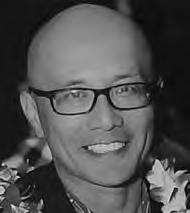
By Will Espero
The prostate cancer diagnosis of former President Joe Biden is a sad and unfortunate announcement from a great man with a stellar political career.
The prostate cancer has progressed to his bones, and the president has handled the prognosis with dignity and grace. Democrats, Republicans, and Independents have expressed their support for the president and have wished him a speedy recovery.
With the death of his first wife and young daughter and with the loss of his oldest son, Beau, to cancer, Biden knows how to handle misfortune and difficult times.
He has bravely addressed his illness and vows to battle forward every day. May our prayers provide comfort and healing to our former leader and president.
The battle between Harvard University and the Trump administration should be watched and monitored by all. Harvard University must win the
war that Donald Trump has unleashed against the university.
The Trump administration is in a vengeful mode, as it has suspended all federal funding to Harvard, which totals over $2.7 billion. It is also trying to cancel existing contracts that Harvard has with the federal government.
History has shown us that governments that have tried to control academia or educational institutions are afraid of educated and knowledgeable citizens.
These dictators or authoritarian figures fear the confidence, conviction, and advocacy of an informed electorate.
Trump is not only going after universities, but also after law firms and journalists.
The common denominator is Trump’s dislike of their past actions, policies, and behavior that he does not agree with.
This is a sign of a vindictive tyrant and is a threat to democracy. If Trump is not stopped by the courts, our society will be in big trouble as Trump rules with fear and intimidation.
The murders of the two young Israeli embassy
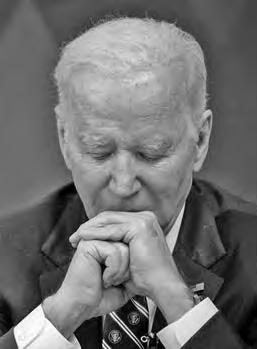
and
The couple planned to get married and spend their lives together. They were a young couple with a long life ahead of them.
Unfortunately, the killings reminded us of the struggles, conflict, and war that have haunted the region for hundreds, if not thousands, of years.
Will Israel and Palestine ever live in peace and friendship? Can Israel and Iran co-exist in a region of peace?
Can Israel and all Arab nations begin a 1000 years of peace and harmony? Will we stop the root causes of terrorism and eliminate terrorism from our earth?
My whole life has seen the Middle East as an explosive powder keg that could ignite any day.
I’m sick and tired of
reading about displaced refugees, civilian killings, and retaliation. I hope and pray that there is someone somewhere that can one day bring a lasting peace to the region.
Our government has spent billions of dollars in the Middle East and Afghanistan. These dollars could have been better spent in our country for education, homelessness, transportation infrastructure, healthcare, and other areas important to our nation.
Until there is peace in the region, the military and charitable spending will continue. I do hope Trump can bring peace to Gaza and end the war against Ukraine. It would be an impressive accomplishment.
In my retirement, I have tapped into my creative side to keep busy and have my mind and imagination engaged.
My latest project was my new poetry book titled BE.
It is a collection of my prose and poetry written over many decades. It includes Haiku, Tanka, prose, and various styles of poetry about nature, Hawaii, events, my experiences, people, love, and heartache.
I am humbled and honored that my new poetry book, BE, has been recognized in several book festivals. BE was selected as runner-up in the London Book Festival and the Great Northwest Book Festival. BE also received an Honorable Mention award at the Los Angeles Book Festival.
BE and my novels, Passion In Paradise and Vengeance In Paradise, are available at amazon.com and barnesandnoble.com. Along with artists Corinne Gallardo and Chanel Tanaka, we have an art exhibit and sale in Waipahu at Camille’s Hawaiian Food located at Westgate Shopping Center. My style of painting is abstract art using acrylic paint. The art will be displayed until June, so stop by for some delicious Hawaiian food and enjoy our art in West Oahu.
WILL ESPERO retired from the Hawaii legislature after serving 19 years in the state House of Representatives and State Senate. He is currently a novelist, poet, and supporter of the arts. Lingering Thoughts provides a glimpse of his perspective on current events and issues
Medicaid for Pregnant Women, and other programs.
Lorna Gasman, Ewa, said her son was on MedQUEST temporarily after he lost his full-time office job and was working only part-time. “I’m thankful that such a program exists because my son required medical treatment during this transitional time in between jobs. One day he was experiencing stomach pain and bloating. We went to the ER because it was sudden and excruciating for him. After running tests,
he was diagnosed with a bacterial infection in his abdominal tract. He was referred to his primary care physician for a follow up. Treatment required medication and fortunately there was no major underlying problem. It would have been very costly if he hadn’t had Med-QUEST.”
life-saving treatments. What about our disabled Americans, how will they survive? It’s frightening what happened to our nation’s values. This bill is like a reverse Robin Hood scam. In Hawaii where it’s already too costly to live, for those who lose Med-QUEST and must come up with more money somehow – if at all possible -- that means there will be a big drop in quality of life for them. We need to save Medicaid from these raiders acting on behalf of the super wealthy.” (COVER STORY: Thousands ....from page 6)
She said Med-QUEST is a crucial safety net for a lot of people for their temporary or permanent medical needs. “I cannot imagine how devasting it would be losing MedQUEST for older peo-
ple, but still too young to qualify for Medicare, with chronic health problems. I’m concerned that sick people will not seek needed treatment if they don’t have health insurance.”
Marylou Salvador, Moanalua, said she believes lawmakers are going in the wrong direction. “Instead of fighting for guaranteed health care for all, like a Medicare for All bill, it’s just cruelty that instead Republicans are proposing to gut Medicaid and take away the health care from millions of children and working
poor Americans, including many in our Filipino community.”
Salvador adds, “It’s disturbing and immoral that Medicaid is being targeted so that wealthy Americans and billionaires can have more tax cuts. I read that the top 0.1% of income earners will gain nearly $390,000 in tax cuts annually from this bill. Meanwhile, the fate of Americans with severe chronic health problems could end in literal death if they cannot come up with the money to continue their
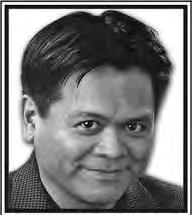
By Emil Guillermo
As AANHPI Heritage Month, or AAPI Heritage Month, has passed, most of my time has been spent thinking about what I am.
Asian? Filipino? Aspanic? What do you call yourself? My Wikipedia page says I’m just American.
My deadline to fill out the latest Census form, the American Community Survey (ACS), came up recently, and while I love identity politics, I hate filling out the forms.
It was my mixed-race Filipino Caucasian daughter who convinced me to just fill out the damn form.
“I want to be counted,” she said. “As mixed.” Don’t say “Caucapino.”
But if you think diversity and identity politics are dead in this new anti-DEI Trump era, think again.
It’s very much alive.
Yes, the landscape is bleak with the attacks and rollbacks on DEI in public and corporate settings. The worst example may be the Defense Department’s homophobic removal of pictures of the Enola Gay.
It only gets worse. On the fifth anniversary of George Floyd’s death, we saw the start of rollbacks of police reform initiatives at the Department of Justice level, where a conservative Asian American, Harmeet Dhillon of the Bay Area, is playing a major role in all the undoing.
What lives matter? No one wants to be so specific anymore during Trump 2.0.
Despite all that, however, we’re also seeing President Trump playing identity politics just the same.
When Trump goes af-
ter international students at Harvard, what else is he doing but taking race politics over the line into outright xenophobia?
He’s hitting the chords in the hearts of his confused populist MAGA base, who hate elitists and hate foreigners.
But they love the contradictions of Trump, the populist billionaire who plays to whiteness.
Who else was spreading lies about a “South African Genocide” that doesn’t exist, but Trump from the Oval Office earlier in May, with propaganda about genocidal murders in South Africa.
The official stats say the actual number of deaths on South African farms is in single digits. That does not make a genocide.
And yet claims of genocide are being used to justify refugee status for White Afrikaners, some of whom are self-proclaimed racists and anti-Semites.
And we thought Trump was fighting anti-semitism?
Maybe he should put them on the plane he got from Qatar and send them all back to South Africa?
Meanwhile, Trump is deporting legitimate refugees like the Asian Americans he’s cruelly relocated them to the Sudan. And then there’s the more than 9,000 Afghans who worked with U.S. forces in Afghanistan. The Department of Homeland Security terminated its temporary protected status also in May.
That’s a far cry from Trump’s treatment of the 54 Afrikaners who are coddled and welcomed so they can procreate with the full endorsement of the 14th Amendment’s birthright citizenship.
It’s made to order. With a drop in the white population, Trump has to

get those white numbers up. Trump’s embarked on an unprecedented identity politics strategy—the importing of white racists to America.
He sure can’t rely on more seepage from Blacks, Latinos, and Asians to grow on the margin of victory that Trump saw in 2024.
And therein lies the importance of the Census. Numbers matter. We need to make sure the country maintains the trend in the 2020 Census, where Hispanics, Blacks, and Asians are growing at an unprecedented pace.
And while this is not the big Census year, it is the year for the American Community Survey (ACS). I have relied on the survey a great deal over the years as a reporter to find out where all the Asian Americans are in any given metro area.
So even the ACS is important. It’s also the law. You must fill it out.
However, as I did so, I realized how some of us have more than a little reluctance.
The form is nosier than I recalled. It’s not anonymous, and it asks for your name, your address, your employer, and their address.
If I were undocumented (I am not), I’d hesitate for sure.
I never hesitated in the past. But I did now.
If you look at what Trump – with DOGE and Musk – have done to undermine trust in this country, I could feel how every question posed before me on the ACS form elicited a “NONE OF YOUR BUSINESS” response in my head.
I don’t mind questions about plumbing and electricity, or the kind of dwelling I live in. But the details on work and income made me see how some people would rip up the form and say, “pass.”
I never had a concern before. But we’ve never had an invasive tool like DOGE trying to gain access to all our private information within the government.
And then you get to the part on the ACS form where they tell you that if you don’t fill it out, they’ll send the Census taker to your house.
But again, under Trump, will it be a Census-taker or an ICE person in Department of Commerce drag.
This ill-feeling about the government is what the Trump administration purposefully has wrought.
Trump’s strategy is to do the unlawful, exceeding the reach of DOGE and its ilk, breaking the law first, then letting the courts decide. But it creates a real distrust of government, in democracy, and in America.
And not just among undocumented Asian Americans, but native-born American citizens like me.
What to do?
We need to be counted. So, of course, I filled out the form.
But who knows what forms will be deleted or discarded officially by the counters? I’d rather we flood them with the truth.
It means we have to maintain faith that honesty
and integrity are still part of government, despite all the lies from the Trump administration on everything fromthe South African genocide to the cover-up of the mistaken deportation of Kilmar Abrego Garcia.
We keep the faith. It’s not easy. I admit to preferring the old “hard part.”
That’s where the agony is, figuring out who we are and which box to check off.
These days, you have a choice. It’s practically an essay question. What do we call ourselves?
Am I Filipino American? Yeah, but…. The Hispanic name raises questions. A red-herring, or a brown one? Does Hispanic by colonization count? Is that a thing? Do I define myself by the geography of my parents? But I’ve only been there once.
Essentially, you are who you say you are. No one will check. For the sake of our coalition, I’m AANHPI.
But I’m Filipino. Uh, doesn’t that divide up and diminish our size? Sure, but when we know who we are by ethnicity we can determine our unique needs.
Ah, yes. But then it’s easier for opponents to divide and conquer.
And then we have the mixed Asians like my kids—the fastest growing among us. They prove that diversity is about love.
It’s still worth filling out the form if you want people to understand the real depth of American blood. We’re all mixed, and that complicates things in America, 2025.
Don’t be fooled. Despite all the actions of Trump, identity politics lives on.
EMIL GUILLERMO is a journalist and commentator. His talk show is on www.amok. com.

By Elpidio R. Estioko
ost of the time, we citizens always demand or expect our government officials, both in federal and local governments, to be accountable for their actions.
We kept saying that they need to be answerable and/or responsible to the people by being prepared to defend/justify all their actions and always doing their best in serving the people.
This is a positive normative culture that all government officials need to understand and adopt.
However, we also need to understand that as citizens, we are also accountable and responsible for whatever we do in the community and in following government laws and norms for the good of society.
As I see it, it must be a two-way process wherein a joint role for government and the people is required to move forward towards full development.
Sometimes, we forget this. Most of the time, government officials also forget
what this is all about.
Again, both must be aware of what we do and what our respective roles are in society for good governance and for a safer community.
As the national government and the local governments head into this year’s development planning and implementation, we need to be reminded of one word in mind: responsibility.
This is a strong reminder for both the government and the population to remember and put into effect!
We have a lot of things to ponder regarding this core value that applies both to those who run the government and to the people.
Locally, I share the sentiments of San Jose Mayor Matt Mahan, who, as he and his local city council are headed into this year’s budget planning process, has one word in his mind: accountability.
In his Dear Neighbor letter to his constituents, he wrote:
“In two weeks, we’ll release our annual March Budget Message and accountability will be at its center. Accountability for City Hall to follow through

on building shelter and moving people off our streets faster. Accountability for property owners to maintain their land and buildings. Accountability for nonprofit service providers to deliver results more efficiently. And yes, accountability for our homeless residents to be good neighbors and come indoors when offered shelter.”
The way I see it, accountability plays a balancing role in charting the city’s annual budget in relation to the various projects of the city in order to deliver more efficient results.
I see this, the dual role
of government and its citizens, as a genuine gesture of positive governance and public service for society to succeed.
The city is focusing on doing more with less.
The mayor added: “You can see how we’re increasing focus, transparency and accountability at City Hall by taking a look at the beta version of our Focus Area Dashboards. You’ll see that we’re now focusing on fewer goals, setting clear metrics for performance, and beginning to move the needle in some areas. Now we need to accelerate our work and ensure that each new dollar we deploy has more impact than the last.”
The mayor reassures that he will be sharing
more about where the city budget is heading in the next couple of weeks for some big announcements.
He urged those who are interested in joining him to advocate for accountability to sign up for more information about how to have a seat at the kitchen table for this year’s budget discussion.
This pragmatic approach that the city of San Jose is heading to can be replicated in any city nationwide, the way I see it!
ELPIDIO R. ESTIOKO was a veteran journalist in the Philippines and a multi-awarded journalist here in the US. For feedbacks, comments… please email the author at estiokoelpidio@gmail.com
The Maui Filipino Chamber of Commerce announced recently the reciepients of its prestigious 2025 Gintong Pamana Leadership and Scholarship Awards.
The 2025 Gintong Pamana Leadership and
Scholarship Awards banquet will be held on Wednesday, June 11, at the Maui Beach Hotel Ballroom, starting at 5:30pm.
The awards recognize outstanding members of the Filipino community in Maui who have demon-

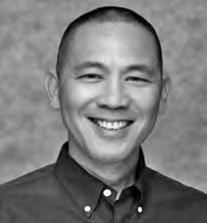
strated leadership and professional excellence in serving the community. Meanwhile, student award winners will receive $1,000 scholarships.
The five Gintong Pamana Leadership Awardees are:



By Renelaine Bontol Pfister
Hawaii-based singer and producer Daju and Philippines-based singer-songwriter Denise Julia released a remix of Daju’s viral hit, “Rain.”
The remix was released on May 2, which coincides with May’s Asian American and Pacific Islander Heritage Month. As of writing, the remix has now reached over 270,000 streams on Spotify.
These two artists, from two different islands, both with Filipino roots, are making their heritage proud while making waves in the R&B music scene.
Dominique Hill, voice of Daju, wrote the song “Rain” when he was stuck indoors while it rained for a week in early 2024. The song about love and loss was released in July 2024.
While the original was a hit, this remix with De-






nise Julia’s second verse presents a fresh angle from both sides of a relationship between two people.
The two artists possess the talent of using their music to open up about their personal experiences and relate to their audience.
Born and raised in Waipahu, Oahu, Daju expressed his interest in music when he was young. He used to watch his father host studio and jam sessions.
For his creative process, Daju shared that everyday life is his influence and that he usually starts “by ‘top-lining’ melodies until something sticks.
“During that whole freestyle, I’ll usually have filler words I randomly throw in there, based on whatever I’m feeling,” he said.
Soon, he was creating







original songs such as “Kodak Moment” featuring fellow local artists 8RO8 and Koins. In 2024, his song “I Don’t Mind” was placed on the MTV show, Catfish. Currently, his greatest success is “Rain,” which currently has more than 2.7 million streams on Spotify. Recently, Daju went to New York to perform “Rain” on the online performance show On The Radar, and to the Philippines to work on the “Rain” remix with Denise Julia.
Denise Julia started writing songs at age 13 and



recording at 18. Her style is influenced by 90s and 2000s R&B music.
She was once a diplomacy and international relations student at Ateneo de Manila University, and appeared in the video “Marikit” by Juan and Kyle in 2020, after which she began working on her own songs.
In 2021, she released her first single, “Difficult,” and gained momentum with her song “b.a.d.”
Her songs reflect her journey and authenticity that appeals to her fans, who have dubbed her the “Patron Saint of Situationships.”
After coming out in 2024, she has also become an advocate and champion of the queer community. Thus far, she has released two EPs: Sweet Nothings (Chapter 1) and Sweet Nothings (Chapter 2).
On December 14, 2024, she held her first concert at the New Frontier Theater in Quezon City, titled “Sweet
Nothings: the Denise Julia Experience.”
Denise Julia has collaborated with other artists, including Jay R, considered the King of Filipino R&B, Vietnamese-American singer/songwriter Thuy, Filipino-American P-Lo, and Filipino R&B singer DENY.
Now, with this collaboration with Daju, she is making her presence known in the Hawaiian Islands where many of her fellow Filipinos can appreciate and support her.
Meanwhile, here in Hawaii, Daju plans on releasing more songs this summer and a project later this year.
The “Rain” remix is a perfect showcase of worldclass talent and what Asian American & Pacific Islander month is about.
Daju hints that “Rain” won’t be their only collaboration and that there might be more to see of him and Denise Julia in the future.

By Rose Cruz Churma
The original Ota Camp, based on a 1960s map, was located near St. Joseph’s Catholic Church in Waipahu.
By 1972, there were a total of 131 individuals who lived in Ota Camp, 11 of them were single, elderly men who were former plantation workers.
They were the first ones who resided at Ota Camp, who cleared the swamp lands in the early 1940s and built their homes on land they rented from Tatsuichi Ota, a Japanese immigrant who arrived in Hawai’i in 1901, and who settled in Waipahu.
Several of these single elderly men built extra homes, which they rented out to incoming residents and their families.
Ota Camp was a low-income community. The residents worked in the service industry as building maintenance staff, yardmen, or janitors.
Some of the men were in construction as heavy machine operators or laborers, while the women worked as cashiers, waitresses, or as workers at Dole Cannery.
A dump site near Ota Camp was also a source of income, where residents collected materials which they sold to dealers at Sand Island.
The residents lived in a barrio lifestyle. The residents tended vegetable gardens; they raised chickens and pigs. Vegetables were exchanged or shared. Although the residents lived in separate households, everyone knew each other, as well as each other’s business. The single elderly men helped babysit their neighbors’ young children, some-
times serving as ninong (godparent) to them.
The homes were called “ramshackle” and “make-shift”, but the homes, although old, were clean and neat, and the residents enjoyed what observers called a “rural lifestyle,” where the kids played in dusty but safe roads.
That lifestyle would be threatened on Christmas of 1971 when a developer who leased the swampy land from Mr. Ota proposed to evict the residents.
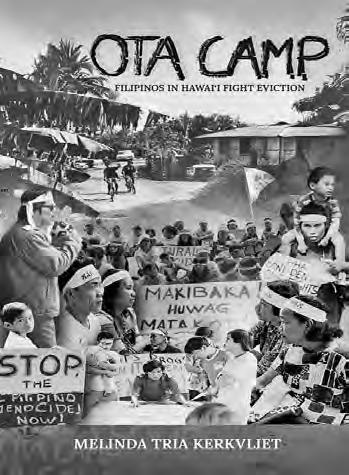
group, chose the Filipino word makibaka, which means “struggle,” for the name of the village that the displaced families would eventually call home.
“The reason why I came up with that name is so people would never forget,” he was quoted as saying when interviewed for a Honolulu Star-Bulletin article on April 15, 2001.
depicted in the Ota Camp eviction story by allowing the main protagonists to tell their story, simply, and in their own voice. The author was able to capture their dreams and fears by interviewing each one.
This book chronicles the Ota Camp residents’ housing struggle. By 1987, the residents won the right to buy their homes and homesites, but it would be another decade before the residents would receive titles to their individual homes.
Ellen-Rae Cachola, an archivist at the William S. Richardson School of Law and lecturer at UH Mānoa Ethnic Studies Department, notes that this book “highlights Filipino organizing in Waipahu during the time of the anti-eviction movements that sparked the Hawaiian Renaissance (1960s-1980s).”
Cachola explains further:
“In a clear, easy-toread narrative, (the author) takes us for a deep dive into the Ota camp history, and situates it with other social movements like Chinatown, Waiahole-Waikane, Sand Island, and Kalama Valley. Kerkvliet provides a transparent coverage of the challenges that Ota Camp residents faced, organizing among low-income working-class Filipino immigrants during the post-plantation era, and provides a humanist portrayal of the gendered
tural dynamics, community disagreements, and family tensions experienced by members of the core organization.”
“But she also describes the resilience and strength of leaders, like Pete Tagalog, who rose out of conditions that sought to keep him in subservience. Equally important were Nora Tagalog, Precing & Johnny Domrique, Nora Bautista, and other elderly residents who served in the background, keeping their organization afloat to weather the struggles, and to finally serve their community’s need for housing.”
Cachola further adds that “the story awakens pride and gratitude for leaders in Hawaiʻi’s Filipino community who stood by their principles, spoke up, and fought for what they deserved.”
In the book’s foreword, this publication is described as an impetus to enhance the understanding of the Filipino experience in Hawai‘i and its contributions to our State because it provides glimpses of how Filipinos’ core values, and their immigration experience have strengthened the Filipinos’ resilience and gave then the courage to resist—in this instance, the eviction from their homes.
Pete Tagalog, the acknowledged leader of the
The documentation of this struggle is important for the younger generations who may be exploring their identity and the history of their families.
This assessment of the past as it impacts contemporary issues is relevant, not just for the Filipinos of Hawai‘i, but for other groups who left their homes for other lands, or those who have been dispossessed of their own.
The Ota Camp struggle was once featured in a local Japanese American journal—the Hawai‘i Hochi—and translated into Japanese. Ota Camp was one of many local communities statewide whose residents were being evicted and dispossessed of their homes by developers during the early 1970s, the boom years following statehood.
But Ota Camp residents prevailed—enduring Hawai‘i’s longest running community struggle.
This small group of 31 Filipino families resisted eviction by organizing and articulating the importance of keeping their close bonds, shared values, and of preserving their culture and way of life, familiar themes also shared by Japanese and other local ethnic communities.
The struggle for affordable housing by Hawai‘i’s working class is
This eviction story is not only a victory for these Filipinos, but also for other local people and native Hawaiians struggling to preserve their culture and way of life, living close to the land that once belonged to them.
This book is timely—the lack of affordable housing and homelessness continue to plague the State. Perhaps the retelling of the Ota Camp struggle will serve as an inspiration.
For the protagonists in this story of resistance and resilience, there is value in being true to their core beliefs—of kapwa, the Filipino core value of shared humanity, interdependence, and shared identity of seeing the self in the other, of focusing on the collective rather than the individual.
The essence of kapwa seeps through as the main characters of this eviction struggle share their thoughts and inner conflicts.
Many non-residents of Ota Camp joined in the eviction struggle. Some of these were students and activists who were also involved in other causes like the creation of the Ethnic Studies program at the University of Hawai’i, providing public access to Hawai’i’s mountains and beaches, or raising awareness of the human rights issues brought about by the declaration of martial law in the Philippines.
A chapter is devoted to four (Gary Kubota, Johnny Verzon, Leon Dagda-
By Seneca Moraleda-Puguan
In early May, tragedy struck outside NAIA Terminal 1.
A four-yearold child of an OFW and a 29-year-old man bound for Dubai were killed while standing at the departure area.
A deliberate attack didn’t strike them down, but by something that should have protected them: the bollards.
Bollards are designed to protect pedestrians and infrastructure from vehicle ramming incidents and accidental collisions.
But those installed outside the airport were substandard and poorly anchored.
What should have saved lives ended up costing them.
This wasn’t just an infrastructure flaw. It was a symbol of something far deeper: the deadly conse-
quences of corruption and irresponsibility.
Like many Filipinos, I was heartbroken. But more than that, I was angry.
Angry at a system that lets negligence pass as normal.
Angry at leaders who sign off on subpar work, pocket public funds, and move on without accountability.
These weren’t just technical failures, they were moral ones.
In a bitter twist, this devastating incident occurred just days before the midterm elections.
As I grieved, I also found myself praying fervently, praying that the elections might usher in a new breed of leaders who value integrity and accountability over personal gain.
The voting process this time felt more efficient

than in past years.
We now have 12 new senators – some fresh faces, others familiar – joining the 12 who remain in office.
Local government officials, mayors, congressmen – new and old – have also taken their seats. While political dynasties and celebrity candidates still cling to power, there were clear signs of hope. Many high-profile celebrities lost. This gave me reason to celebrate, proof that Filipinos are beginning to see beyond popularity and pomp.
Dancing, flashy car-

avans, and familiar surnames are no longer enough to win hearts and votes.
A large portion of the electorate were Millennials and Gen Z voters. And they showed up not just in numbers, but in wisdom.
These generations are less swayed by “ayuda” (handouts) and more attuned to policy, transparency, and real service.
One of the clearest examples of this shift happened in Pasig. Mayor Vico Sotto’s slate, Giting ng Pasig, swept the local elections without huge rallies, expensive gimmicks, or celebrity endorsements. Their strategy? Listening. Going door to door. Showing up not with giveaways, but with genuine commitment. And it worked. The people responded.
Yes, the road ahead remains long and difficult.
Traditional politics still
dominates many regions. Patronage is still alive and well. But these small wins during the election offer a glimmer of light. They remind me that change doesn’t happen overnight- but it can begin with one vote, one leader, one city at a time.
Praise God for every answered prayer and for every courageous voter who chose integrity over influence.
We cannot bring back the lives lost outside NAIA. But we can honor them by refusing to accept a system that allowed such a tragedy to happen in the first place.
If we continue to support leaders like Mayor Vico Sotto who are competent, God-fearing and truly for the people – and if we raise and guide the next generation to reject corruption and champion justice – then the Philippines can become a nation where no child, no worker, no traveler loses their life to a substandard bollard again.


By Dr. Arcelita Imasa
Mabuhay po kayong mga caregivers!
First and foremost, maraming salamat po sa inyo! Thank you for all that you do.
Caregivers are among the most compassionate people in our communities. If you are a caregiver, please know this and never forget it. And if you know someone who is a caregiver, count yourself lucky!
As part of the Hawaii Workers Center — founded in 2020 to advocate for the rights of low-wage workers — I had the honor of helping organize caregiver appreciation events in the past two months. And the experience has been nothing short of fulfilling.
At our events, we were deeply moved to hear pieces of caregivers’ life stories — their journeys, their challenges, their hopes.
It’s not easy to step into someone else’s shoes, but these caregivers bravely opened up and allowed us to understand a part of what they go through. The challenge for us, in turn, was to truly listen and learn from their experiences. I left those events feeling both wiser and inspired.
June 7 is recognized as World Caring Day, or Caregivers Day. Care is a powerful word. To me, it means putting another person’s well-being above one’s own.
For caregivers, this is not just an occasional act — it’s a way of life. Every minute, they show up with love, strength, and patience.
On this Caregivers Day, let’s take a moment to recognize our caregivers as some of the most selfless and compassionate individuals in our community.
This day is a special day, let it be a gesture of our deep and collective gratitude. Caregiving is one of the hardest and most meaningful roles anyone can take on.
I know this firsthand — I worked as a caregiver my-

self for many years while putting myself through college. I didn’t mind the lack of applause or fanfare for the hard work I was doing back then. And I know many caregivers feel the same.
But I also earned a lot from that work experience. Not everyone can take on this role. It requires patience, strength, empathy, and unwavering commitment.
Whether it’s offering daily support, companionship, or simply being present during difficult times, caregivers make a profound difference, often quietly and without recognition. And, caregivers are not paid enough. Many lack the workplace protections that become essential when injuries happen on the job. Caregivers often can’t save
By Keli‘i Akina
With Hawaii’s 2025 Legislative session in our collective rearview mirror — and while we await Gov. Josh Green’s action on dozens of measures — it’s time to assess how well our lawmakers worked on our behalf.
Did they build on the momentum of major measures that passed last year, such as historic income tax cuts and groundbreaking housing reforms, or did they rest on their laurels and pump the brakes?
More importantly, did they walk back any of those 2024 wins as many feared?
Thankfully, they seem to have kept the pedal to
the metal, as there are many positive results to report.
Not only did lawmakers preserve the historic income tax cuts that took effect in January, but they also rejected almost all of this session’s major tax-hike proposals.
Unfortunately, a perennial push to increase the state transient accommodations tax was finally successful, and the measure that crossed the finish line also extends the TAT to cruise ships.
However, it is worth celebrating that a bill to increase the unemployment contribution tax on businesses died, along with one that proposed increasing the state’s capital gains tax.
Other measures that rightfully failed include a wealth asset tax and a mas-
for retirement, and they go without basic benefits that every worker deserves.
Many caregivers are either paid under the table, by private employers, or through compensation tied to Medicare and Medicaid-funded programs.
Mental health challenges — including depression and guilt — are also common among caregivers due to the demanding and emotional nature of the work.
I often reflect on Hawaii’s history of migration and how it shaped the caregiving workforce today.
How did so many Filipinos, for example, come to be in this line of work? How did caregiving come to be seen as “women’s work”? How did we transition from plantation labor to caregiving, pushing caregiving into the realm of immigrant labor?
These are questions we must keep asking.
So today, and every day, as a community, let’s shine a light on our caregivers. Let us show that we see their sacrifices.
Let us honor the care
they provide — not just with words, but with our hearts and actions. Everything we can do is possible in part because of the quiet strength of caregivers.
Caregiver appreciation means more than saying “thank you.” It’s about acknowledging the humanity and dignity caregivers bring into every life they touch.
Without caregivers, our loved ones would be lost. Many lives would feel less hopeful.
To all caregivers out there: we celebrate you. We appreciate you. And we are so proud to stand with you. Thank you for everything that you do.
To our community: let’s lift up our caregivers in every way we can. Let’s come together and make advocacy for caregivers something we do every day. Contact me at hiworkerscenter@ gmail.com.
Dr. ARCELITA IMASA is a practicing family physician and the secretary of the Hawaii Workers Center’s Executive Committee of the Board. She grew up in the Philippines before migrating to Hawaii with her family more than a decade ago.
sive carbon tax increase.
We can only hope that our lawmakers won’t revisit these harmful policies in the future.
Speaking of harmful policies, it is also worth cheering that the 2025 Legislature moved to roll back even more restrictive homebuilding regulations.
Specifically, it approved SB66, which directs the counties to establish a new element into their permit processes called self-certification; HB422, which eliminates school impact fees for home projects under 100 units and substantially reduces them for other housing projects; and two bills aimed at speeding up historic property reviews: SB15 and HB830.
Also related to housing, especially for our Maui ohana, the Legislature passed SB1296, which will codify the governor’s emergency exemption from Special Management Area regulations for hundreds of coastal structures in Lahaina that were destroyed by the August 2023 wildfires.
Although it is disappointing that the final version of the bill does not apply the same exemption to properties directly along the shoreline, it still marks a major win for speeding up the rebuilding process.
Finally, the Legislature took a brave step forward in passing civil asset forfeiture reform.
State law, unfortunately, allows law enforcement to seize property allegedly associated with a crime, sell it, and keep the proceeds
— even in the absence of a conviction or without charges having been filed.
But HB126 would limit civil asset forfeiture to only cases in which the property owners are charged with a crime within the first year after the seizure.
A similar bill made it all the way to Gov. David Ige’s desk back in 2019, after the state Office of the Auditor produced a report criticizing the forfeiture program, but he vetoed it under pressure from law enforcement groups.
Overall, a lot of good came out of the 2025 Legislature on many fronts. No session is perfect, but what a relief it is to look back on yet another one with much hope for Hawaii’s future.
KELI‘I AKINA is president of the Grassroot Institute of Hawaii.
LET’S ZUMBA | FilCom Center | Consuelo Courtyart, FilCom Center, 94428 Mokuola St, Waipahu | Every Monday at 6:15pm | Need to unwind in movement and dance after a long workday? Join the community as we Zumba through the evening. For more information, visit https://filcom.org/ communityprograms.
BALLROOM DANCE LESSONS | FilCom Center | Consuelo Courtyart, FilCom Center, 94-428 Mokuola St, Waipahu | Every Tuesday at 6:30pm | Calling all beginners
to advanced ballroom dancers. No experience necessary. For more information, visit https:// filcom.org/communityprograms.
KING KAMEHAMEHA CELEBRATION
HO’OLAULEA | Hawaii Tourism Authority, Kala Foundation | June 14, 2025 from 11am to 5pm | Kapiolani Park, 2805 Monsarrat Avenue, Honolulu | Celebrate King Kamehameha Day with Hawaiian cultural activities, live entertainment, Hawaii-made products, food booths and more. Free admission to the event. For more information, visit instagram.com/
kingkamehamehacelebration/.
MADE IN HAWAII FESTIVAL | Hawaiian Airlines, Made in Hawaii Festival, Hawaii Food Industry Association | Hawaii Convention Center, 1801 Kalakaua Avenue, Honolulu | August 15-17, from 10am to 5pm | Buy Hawaii, for Hawaii. Shop and browse hundreds of vendor booths from the state’s most talented local artisans. Enjoy live awardwinning music and performances, watch cooking demonstrations and meet with some of the island’s most talented fashion designers. Visit instagram.com/ madeinhi/ for more information.
By Andrew Perez
Iwas raised in a Christian school, where I participated in mission trips, retreats, and Sunday school.
During this time, I even prayed to accept Jesus as my personal Lord and Savior. I was also the captain of our school’s volleyball team and an officer in our student organization, which I thought painted a picture of a “perfect life.”
In reality, I came from a broken family and never met my father—a man I longed for, to love and be loved by. As a child, I grew up without a father figure to guide me through my formative years.
I was often teased about my identity and had no one to confide in. The confusion in my life deepened after I experienced repeated sexual molestation during my athletic days.
By the time I reached college, I had started drinking, smoking, and getting absorbed in computer
games. I had short-term relationships with women, struggling with issues around my identity.
Eventually, I began using dating apps to connect with men, engaging in immoral acts in secret, away from my family and friends. This lifestyle soon took a toll on my academics.
My grades dropped, I lost my scholarship, and I failed to graduate. I cried out to God, and by His grace, I received another scholarship at a different school.
Though I tried returning to church, I still led a double life.
When I started my career, I met a man and moved in with him. I thought this relationship would last, but it soon turned toxic, leaving me with suicidal thoughts.
I knew I needed help and cried out to God for a way out. Then, I was invited to a Bible study at work.
I began attending regularly, learning more about
(BOOK REVIEW: Ota Camp ....from page 12)
gan, and Herb Takahashi) staunch supporters of the struggle.
Johnny Verzon produced a video documentary some years back on the eviction story.
Leon Dagdagan documented the struggle through his photographs, and these candid photos now provide us with glimpses of the residents’
lifestyles and their activities as they navigate the processes required to organize and interact with the authority figures of the State and City governments.
The book’s author, Melinda Tria Kerkvliet, received her doctorate in history from the University of Hawai’i. Her book, Manila Workers’ Unions,

Jesus, and praying for a church community.
Passing by Christ Commission Fellowship (CCF) on my way to work, I decided to attend a service. I arrived early and joined the pre-service prayer. As I prayed for direction, I heard a clear whisper saying, “LET GO.”
From that moment, I committed to surrender everything to God. I ended my immoral lifestyle and devoted my life fully to Jesus.
God slowly transformed my heart, making me want to seek Him more. He blessed me with a discipleship group and a leader who accepted me without
1900-1950, was published in 1992. Her second book, Unbending Cane; A Filipino Labor Leader in Hawai’i, a book on Pablio Manlapit, was published in 2002.
She is a former director of Operation Manong (now Office of Multicultural Student Services) at the University of Hawai’i.
As a charter member
judgment.
I attended a True Life retreat and a singles leadership conference, where I felt God’s call to start my own DGroup. I began volunteering in the Sports Ministry while praying for God to provide members for my DGroup.
In February 2019, He entrusted me with my first member, and over time, more joined. During the pandemic, God gave me the courage to share the gospel with my brother, his family, and later with my mother.
By His grace, I also met my “God’s best,” and we are prayerfully looking forward to marriage in His perfect time.
of the Filipino American Historical Society of Hawai’i (FAHSOH), she has been conducting oral interviews with various individuals who have made significant contributions to Filipino American history in Hawai’i.
A book talk featuring this publication will be held on June 21, Saturday, starting at 10 a.m. at the
Currently, I lead a total of 10 members in two DGroups and continue to share God’s word with athletes across different universities.
Looking back, I see how God’s faithfulness has been my constant guide. My life was a mess, but Jesus turned it around, bringing me from spiritual death to life. I have learned that my identity is found in Christ alone.
As Galatians 2:20 says, “I have been crucified with Christ; it is no longer I who live, but Christ lives in me; and the life which I now live in the flesh I live by faith in the Son of God, who loved me and gave Himself up for me.”
ANDREW PEREZ is cdeeply passionate about sharing the gospel and testifying to the transforming power of Christ in his life. He currently leads two Discipleship Groups, and he continues to pray for growth in these groups. Through his leadership, he encourages each member to pursue a life fully committed to Jesus, living as true disciples who multiply and reach others for Jesus Christ
Hawai’i’s Plantation Village.
ROSE CRUZ CHURMA established Kalamansi Books & Things three decades ago. It has evolved from a mail-order bookstore into an online advocacy with the intent of helping global Pinoys discover their heritage by promoting books of value from the Philippines and those written by Filipinos in the Diaspora. We can be reached at kalamansibooks@gmail.com.
